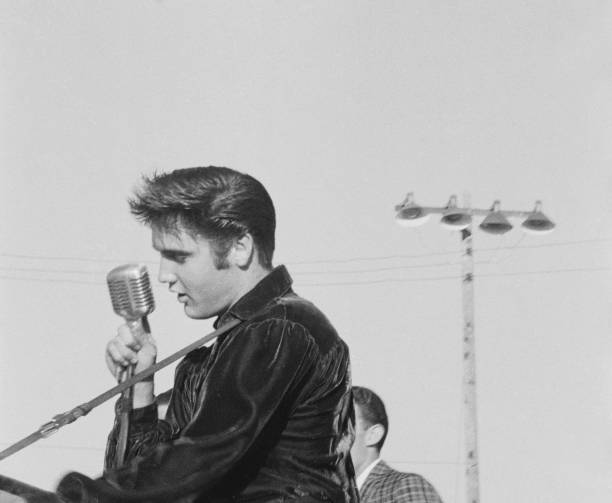 Introduction and Short Summary of the Song
Introduction and Short Summary of the Song
Released in 1969 as part of the soundtrack for the MGM film Change of Habit, “Rubberneckin’” is one of Elvis Presley’s most energetic and soulful late-1960s tracks. Written by Dory Jones and Bunny Warren, the song embodies the Memphis soul sound that was influencing Presley’s music during this period. With its driving rhythm, gospel-inspired backing vocals, and playful lyrics, “Rubberneckin’” showcased Presley’s ability to blend rock, R&B, and funk elements into a performance that felt both contemporary and timeless. Though originally tied to a film, the song achieved enduring popularity, later revived in the early 2000s with a remix that introduced it to a new generation.
Origins of the Song
By 1969, Presley was in the midst of one of the most important comebacks of his career. His 1968 NBC television special had reestablished him as a major force in popular music, and the American Sound Studio sessions in Memphis produced hits like “Suspicious Minds” and “In the Ghetto.” Against this backdrop, Presley was also fulfilling his film contract obligations. Change of Habit, released in 1969, was his final scripted movie role, and “Rubberneckin’” was included as one of the soundtrack songs.
---> Scroll down for the VIDEO
The track was recorded at American Sound Studio on January 20, 1969, with Chips Moman producing. The choice of studio musicians—known as the “Memphis Boys”—and gospel-style backing vocalists helped infuse the song with the distinctive Memphis soul sound that dominated the era.
Why Elvis Released “Rubberneckin’”
Although tied to a film, “Rubberneckin’” was recorded with far more energy and authenticity than many of Presley’s earlier soundtrack songs. RCA decided to release it as the B-side to “Don’t Cry Daddy” in 1969. While the A-side achieved significant chart success, “Rubberneckin’” quickly developed a life of its own, becoming a fan favorite for its funky groove and infectious rhythm.
---> Scroll down for the VIDEO
Its release underscored Presley’s renewed connection to contemporary sounds. At a time when rock, soul, and funk were shaping the musical landscape, “Rubberneckin’” showed Presley was not only aware of these trends but capable of delivering them with authority.
The Message Conveyed in the Song
The lyrics of “Rubberneckin’” are lighthearted and playful, focusing on distraction and attraction. The term “rubberneckin’” refers to gawking or staring, often at something captivating or unusual. In the context of the song, it’s about being unable to look away when caught up in the excitement of love, lust, or sheer fascination.
Rather than offering deep philosophy, the song delivers fun and vitality. Its message is simple: sometimes life’s joy is in the energy of the moment, in letting yourself get carried away by what you see and feel. Presley’s delivery adds a sense of flirtation and mischief, turning the song into an irresistible celebration of impulse and attraction.
The Recording and Musical Characteristics
“Rubberneckin’” reflects the Memphis soul influence that permeated Presley’s 1969 sessions.
-
Vocals: Presley’s performance is spirited and playful, balancing grit with charisma. His phrasing channels both gospel passion and rock swagger.
-
Backing vocals: The female gospel-inspired harmonies echo and respond to Presley’s lines, adding energy and a call-and-response dynamic.
-
Instrumentation: The rhythm section, anchored by bass and drums, drives the groove, while electric guitar and piano add texture. Horn-like flourishes and handclaps enhance the funky feel.
-
Mood: Upbeat, funky, and celebratory, the track feels like a jam session between Presley and the Memphis Boys, full of spontaneity and joy.
The raw energy of the recording made it one of Presley’s most infectious tracks of the era, even though it was initially relegated to a soundtrack release.
Cultural and Commercial Impact
Upon release, “Rubberneckin’” was overshadowed by its A-side, “Don’t Cry Daddy,” which became a Top 10 hit. However, the song gained traction among fans for its energy and modern sound. Critics later recognized it as one of Presley’s best late-1960s performances, distinct from the formulaic soundtrack songs that had weakened his reputation earlier in the decade.
Its cultural impact expanded decades later. In 2003, Dutch DJ Paul Oakenfold remixed “Rubberneckin’” in the same style as the successful Junkie XL remix of “A Little Less Conversation.” The remix reached the Top 5 in the UK and other international markets, reintroducing Presley to younger audiences and confirming the timeless appeal of the track’s groove.
Legacy of “Rubberneckin’”
Today, “Rubberneckin’” is remembered as one of Elvis Presley’s hidden gems from 1969, a song that captured the spirit of his Memphis comeback even while tied to a Hollywood film. Its infectious rhythm and soulful energy stand as a testament to Presley’s versatility and his ability to stay relevant in changing musical times.
The remix success in 2003 further cemented its place in Presley’s catalog, proving that even decades later, his recordings could resonate with new generations when paired with contemporary production. Fans now see it not only as a fun soundtrack number but also as a vital part of Presley’s late-1960s renaissance.
More broadly, “Rubberneckin’” underscores Presley’s unique ability to merge gospel fervor, R&B grit, and rock-and-roll charisma into a single track. More than fifty years after its recording, it remains a celebration of spontaneity, attraction, and sheer musical joy.